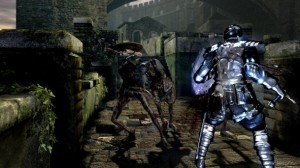

Because the world has not yet gone utterly mad, I had the chance, on my last vacation, to sit down and play video games with my friend Marlin and my brother. As a professional person living a semi-standard contemporary lifestyle, I don’t usually have time for dedicated gaming and so this hobby, which I enjoyed substantially at various stages of life when time was more easily spent, has fallen by the wayside.
In the same evening we played both Dark Souls and Kentucky Route Zero. I learned something about myself that night, and something about these weird things we call “video games.” Here is what I learned:
VIDEO
“Kentucky Route Zero” and “Dark Souls” are radically different experiences. In the former, a disgustingly slick visual presentation delivers a series of significantly meaningless choices to the player as it explicates a mood, a setting and a story. The the latter game, just as much staggering expertise is devoted to the development of a perfectly balanced interactive system of punishment and reward. As a matter of course, “Dark Souls” furnishes its own fairly well developed and delivered mood and setting, but it is unmistakably the context for the play rather than the point of it.
“Kentucky Route Zero” is, undeniably, a fine piece of craft which is aware of itself and its cultural surroundings. And I have to admit, I found the experience engaging, particularly as a kind of spectacle. But “Kentucky Route Zero,” for all of its awareness of itself as a supposed “game,” seems mostly interested in undermining itself as an interactive experience. A great recipe for alienation is forcing a person to make choices which she knows do not matter, and “Kentucky Route Zero” seems pretty interested in this trick. Early in the game the player is forced to guess a password based on the fact that it is a “long poem, which really sums it all up.” They are prompted with a series of three choices of lines from three different poems and any series of choices works. The poems themselves are nice, and one does get a pathetic little frisson of pleasure at the prospect of mixing and matching them but in the end, the decisions don’t actually matter.
The entire game is a series of little, often very well conceived and executed vignettes in which the player’s choice doesn’t really matter. At the very best we can think of the game as a kind of psychological test which is never evaluated by anyone. This is thin gruel, and we might wonder why the creators of the game, who are clearly in possession of tremendous talent and skill, bothered with an interactive experience at all.
GAMES
Let’s contrast this experience with “Dark Souls.” “Dark Souls” is the quintessential videogame, or at least the most quintessential game I’ve played recently. What do I mean by this? Well, “Dark Souls” is too a product of apparently profoundly skilled craftspeople, but where in “Kentucky Route Zero” the craft is devoted to style and narrative substance, “Dark Souls”‘s creators devoted most of their energy to the invisible, mechanical systematics of the game and to the job of communicating those systems to the player, clearly.
It has been for some time de rigueur for videogames (of which Final Fantasy VII or Metal Gear Solid are exemplars) to pack their narrative into “cutscenes,” which are just non-interactive, generally cinematic or intended as such, scenes in which story is advanced. “Dark Souls” has essentially none of these, recognizing them as fundamentally alien to a fundamentally interactive medium. Instead, “Dark Souls” thrusts you immediately into the business of moving your avatar through space. After a very brief interactive tutorial, the player finds herself contending with a series of interactions, diegetically presented as medieval combat, which require attentive reaction to an interlocking set of concerns.
The player has a weapon, a shield, health, and stamina. She generally faces similarly outfitted, sometimes oversized, versions of herself. Holding up one’s shield prevents one’s stamina from regenerating, as it does rather quickly, otherwise. Blocking a blow costs stamina, as does an attack or a dodge. If one’s stamina is drained she can neither attack effectively nor defend or dodge. On top of these actions, the game layers timing: it takes a moment to raise your shield, it takes varying amounts of time to strike, time which leaves you open to counter attack. It takes time for one’s stamina to regenerate, time during which the character is vulnerable. These systems, in and of themselves, are well designed but not particularly unusual for videogames.
What distinguishes “Dark Souls” is that it is not afraid to make the primary focus of the game these simple, balanced systems. It isn’t afraid to offer real reward and punishment for understanding them. The designers of the game were confident enough to sell the experience of “Dark Souls” as primarily the gameplay, rather than circumstantial narrative content. As such, “Dark Souls” can afford to apply a gentle touch to the subjects of setting and narrative. There is a latent story going on here, but, while we can enjoy it, and it may motivate us to play, the story is definitively not the game.1
YOU DIED
Like the snooty intellectual I so obviously am, I have often bemoaned the boringness of videogame subject matter. Do we really need another game about big dudes hitting eachother with things until one of them dies? From this perspective I welcome the arrival of games like “Kentucky Route Zero,” as refreshing alternatives to mainstream game content.
However, “Dark Souls” reminds me that there is still enormous material to be mined the realm of mechanics, which are the elements of videogames as a medium which cannot be reproduced elsewhere. It is a definite problem that his material is being mined in a pretty boring, heteronormative context of dudes hitting dudes, but I can’t help but feel, at the end of the day, that “Dark Souls” is better at being what it is than “Kentucky Route Zero.”
Footnotes
1: I’d like it if we could stop saying that “Dark Souls” is “hard.” “Dark Souls” is only “hard” because the relationship between the superficial and significant elements of the game, the progress the player makes in the world or plot vs the progress the player makes in her mastery of the mechanics, is misleading. The player experiences lots of progress in terms of her knowledge and ability to work the in-game systems, even when the false progress through the story or environments of the game is stalled.